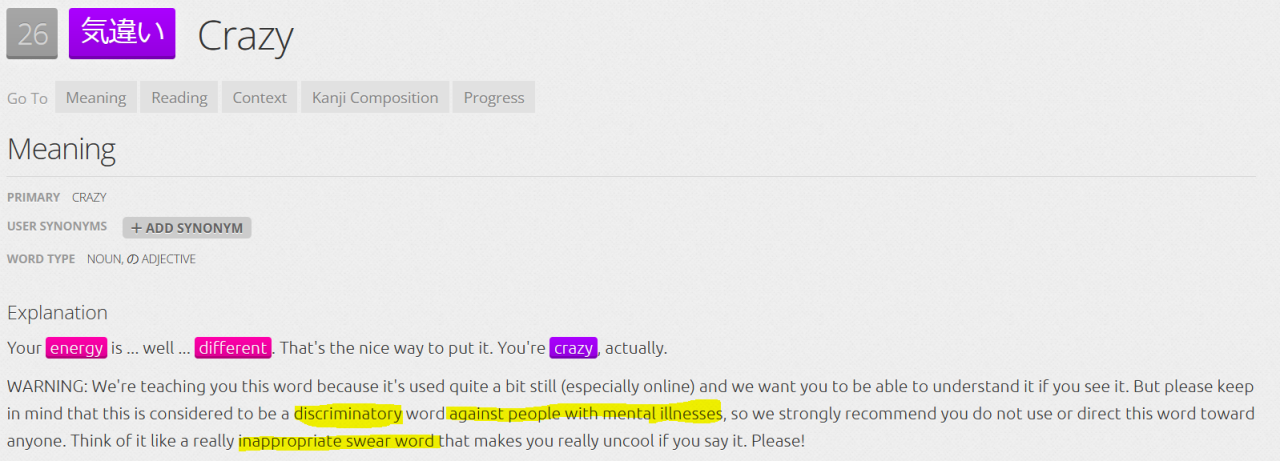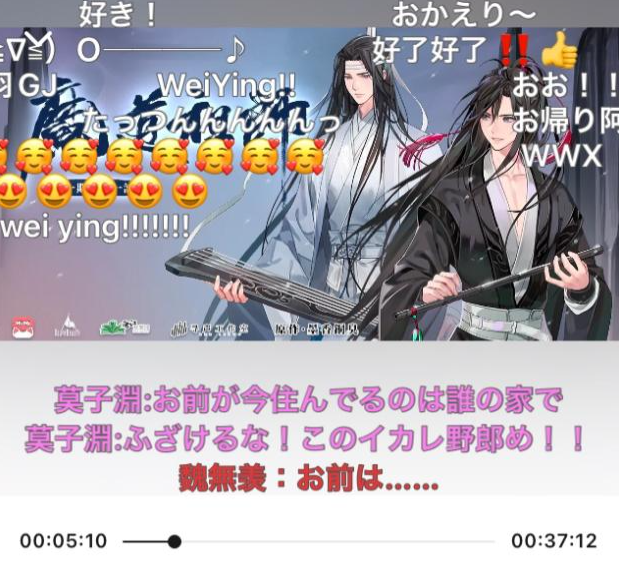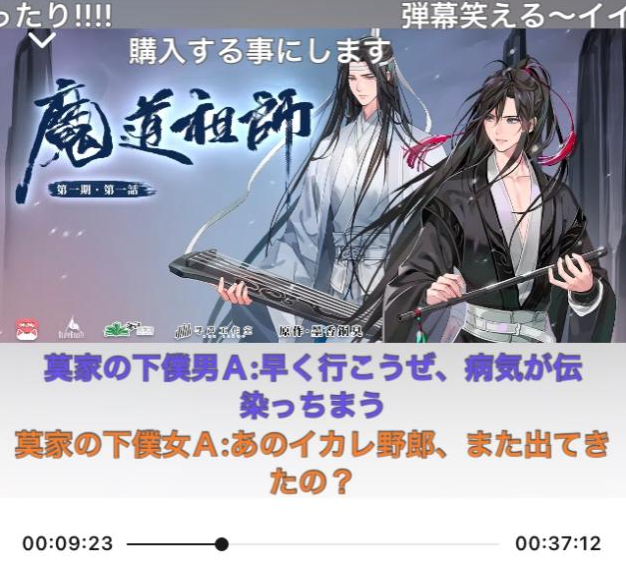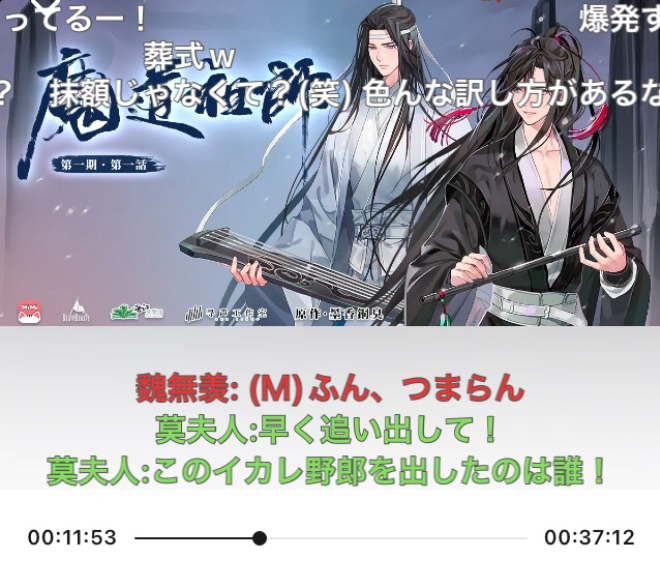Chapter 3 驕傲 Arrogance
Corresponding ExR: Arrogance Part 1 FW pages 54-62
槐の木 enju no ki Japanese Pagoda tree—technically they’re from mainland China. Have a picture:
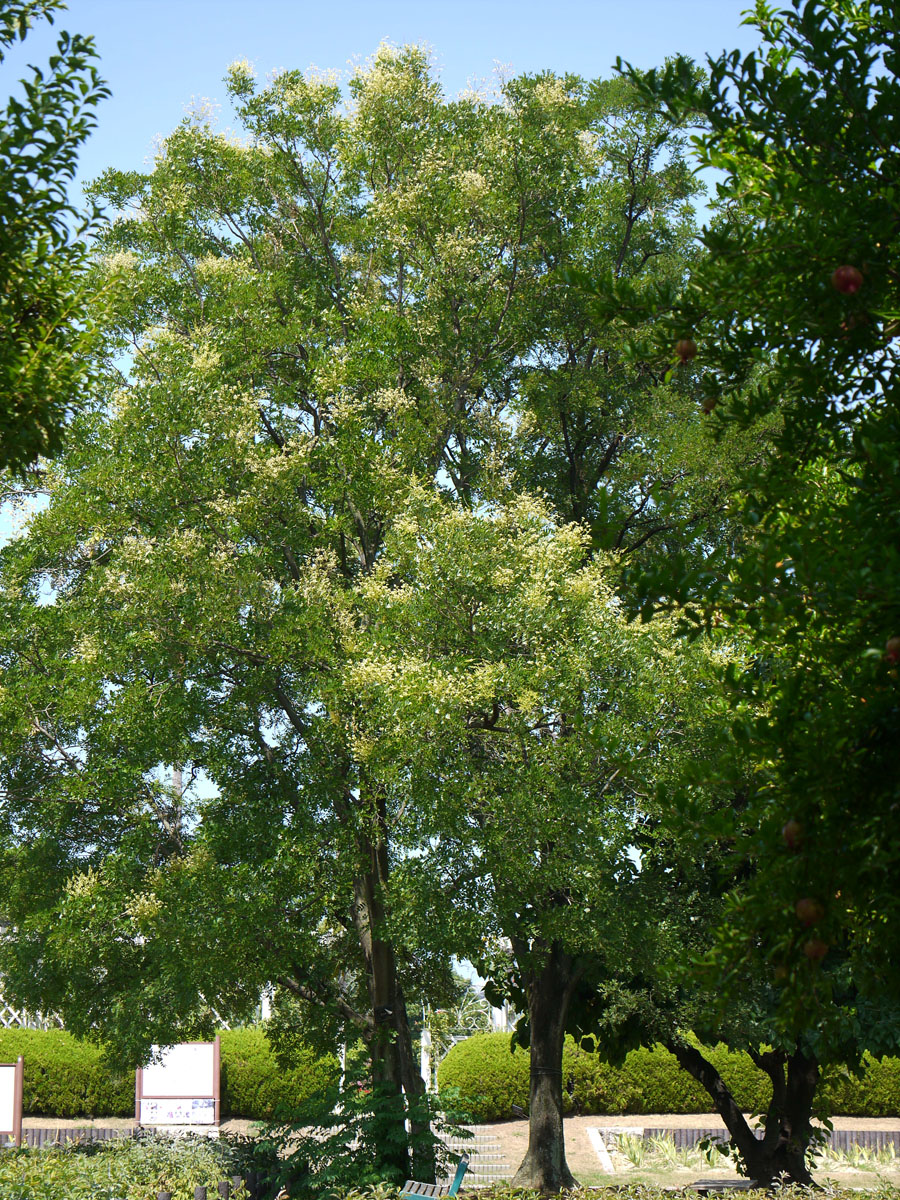
大梵山・大飯山 this pun doesn’t work. The homophone just isn’t there. In Chinese, both would be pronounced da4fan4shan1. In Japanese you have daibonzan and daihanzan. Could it have been force fit with another kanji? Honestly, that’s above my pay grade. They could have just added furigana and called it a day. There are a ton of kanji that mean “Buddha” because a ton of Hindu mythos come preinstalled with Buddhist literature. 梵 bon is not only Buddha but also Brahman—the Hindu creator god. 佛 butsu points at Shakyamuni Buddha, i.e. Siddhartha Gautama himself, but has fallen mostly out of use. In modern usage 仏 butsu appears to be preferred.
EDIT: I had a thought. 大盆山 daibonzan Mount Great Platter.
Source: https://happylifestyle.com/9123
The settlement of “Buddha’s foot” fo2jiao3zhen4 at the base of Mount Dafan/daibonzan, 佛脚鎮 bukkyakuchin threw me off for a couple reasons. “Foot” and “leg” are effectively interchangeable as they’re both pronounced ashi. I had to triple check what the difference is.
- 足 = the part below the ankle.
- 脚 = the part below the abdomen.
- I do not know if this is the same or different in Mandarin. My usual sources just aren’t cutting it. I’d need to go to Baidu.
鎮 chin is “tranquil”; it’s only used to mean “town” in China, and even then, what kind of town seems to change over multiple dictionary entries. From the Seisenban Nihon kokugo daijiten via Kotobank
Definition 6: From the Northern Wei dynasty (386-534 CE) forward, the name of the land protected and public order maintained by the stationed military force, or the name of that army corps. = Garrison Definition 7: End of the Tang dynasty (618-907 CE) and through the Five Dynasties period (907-979 CE), a strategic and economic location to which a Jie2du4shi3 (regional military governor in ancient China, 節度使) would dispatch their underlings, and administrate both civil and military government. From the Song dynasty (960-1279) forward, a small city belonging to a prefecture. Alternatively, a large town with bustling commerce. Also see “flower market.” =Town
Given that MDZS is effectively a Wuxia story set in “Jianghu”, and Wikipedia says that Jianghu stories usually take place somewhere between 1000 BCE and 280 CE; I want to use “Buddha’s Leg Garrison” as my preferred translation, but MXTX sensei lives in the 21st century just like the rest of us, and she’s not necessarily writing historical fiction here, so “town” is probably the right way to go.
The “Compass of Evil” 風邪盤 fuujaban–I’m afraid I can’t come up with anything significantly better. 風邪 is kaze “cold”, but “compass of illness” just doesn’t work in context. It’d be best to take each character individually. Correction: I like “compass of ill winds” a lot better than “compass of evil” for 風邪盤 fuujaban. (7S pg 60)
I’m afraid I don’t have much to report about 遊猟 yuuryou “hunting” or 夜狩 yogari “night hunting”. 猟 leans toward game hunting while 狩 doesn’t necessarily. However 狩 also has secondary definitions of “gather” and “raid”. Nothing stands out to me at this time.
悪鬼殺鬼 doesn’t appear to be a word on the surface, and probably should have furigana, as I could potentially read it as either akki sakki or akki sekki. Akki is self-explanatory, a “demon” or “evil spirit”. Sekki is “a fearsome thing which kills people and destroys things.” (I surmise that the second “things” is supposed to be the 万物 wan4wu4/banbutsu of the universe in religious literature.) Also synonymous with the aforementioned akki and rasetsu, a “rakshasa” from Buddhism (via Hindu canon). 悪鬼羅刹 akkirasetsu IS a word I was able to find: “man-eating fiend”. Interestingly enough, when they’re talking about soul-consuming beasts 食魂獣 shokkonjuu and spirits 食魂殺 shokkonsatsu later in the chapter, 殺 (“to kill”) is used for “spirit”. I have another post somewhere where I go on a meandering journey trying to keep a glossary straight, and I'll repost that eventually, probably less meanderingly.
It felt like a bit of a leap of logic for because I couldn’t find any other precedent during my research. So part of the reason I went with “spirit” for 食魂殺 shokkonsatsu is because that’s what ExR did, because of the taxonomy explanation on pg. 61, and because of my desire for inter-textual consistency. (I am seriously considering whether to throw that last part out entirely, but if I do that then readers might get confused when I say, for example, the Lan Clan resides in “Some Unknown Place Deep in the Clouds” or “Unshinfuchish” 雲深不知処, but “Cloud Recesses” is nice and snappy, and I like it as a set translation.) I’d even offer you “soul-eating killer” as an alternative translation, since that’d be more literal.
For 死霊 shiryou, Denshi Jisho offers “spirit of a dead person; ghost; departed soul”. And as I said last night, I’m trying to reserve “ghost” for 鬼 exclusively to get to the bottom of the 魔道・鬼道 debacle. EDIT: The JP text seems to be pretty consistent about referring to WWX's novel magic as 鬼道 kidou/gui3dao4. Meanwhile, if you look up “ghost”, there are 164 entries on Denshi Jisho–only the first 18 are somewhat relevant. The Kodansha English-Japanese Dictionary (1st ed. edit Kawamoto Shigeo et al.) has 8 entries. What is the nitty gritty difference between a ghost, specter, apparition, revenant, fiend, and phantom? We’re really splitting hairs now. As an overarching statement, I doubt English demonology has enough overlap with Sino-japonic demonology to truly answer this question without any arguments, and I don’t have the time or academic resources I would want to really get into the weeds. (I’m probably going to have to start keeping a running glossary too…)
For pagination’s sake, I did crack open the 7S version, and I like what I see there a little better than ExR for a handful of the quotes I cherry picked below.
He had Wei of starting conflict, you might say. (7S pg 63)
Kudos for the pun working.
Even though the difference was but one word, they were completely distinct creatures. Fiends belong to the ghost category while beasts were of the monster category. (7S pg. 66)
I like this alternative translation up until this point, but I do need to provide the next sentence. That’s where I don’t like it anymore.
To him, it was likely that the landslide had destroyed an ancient tomb, and, with lightning splitting the coffin open, a resting spirit has been let out. (ExR)
In his opinion, all this might be the fault of the old graveyard that had collapsed from the tremors of the landslide. Once lightning struck one of the coffins, any ancient fiends that were resting within would be unleashed. (7S pg 66-67)
おそらく山崩れで墓地が壊されて雷が棺に落ち、その中で眠りについていた古の悪霊を呼び起こしてしまったのだろう。(FW pg. 61) In all likelihood, the grave had been broken in the landslide, and lightning had struck the casket, which probably aroused the ancient evil spirit that had been sleeping in there.
ExR, you’re dropping words again. 7S, you’re introducing new taxonomies that haven’t been mentioned yet in an assumption that they’re synonymous. This is naïve at best. Get Wrecked in Lan Qiren’s class.
Glossary so far
霊 = “spirit, soul” as per New Nelson entry #6532 悪霊 = evil spirit. Denshi Jisho also suggests “demon” but I think that needs to stay in reserve for now. 悪魔 = fiend but I might want that to say in reserve for now because of that second character…
And now back to the regularly scheduled post from that massive tangent... First thing that caught my eye this chapter was actually the donkey.
“You’re definitely destined for wealth, even harder to please than me.” The donkey spat at him. (ExR)
「お前って本当にいいご身分だよな。俺よりも手がかかる。」 やれやれとため息をつく魏無羨にロバは「フン」と強く鼻息を吹きかけた。(FW pg 54-55) “You’ve got great social standing. You take even more to deal with than me.” The donkey gave a loud snort to the exasperated Wei Wuxian.
There’s another segment on the next page where the donkey “opens its mouth” for an apple, but I’d advise imagining it peeling its lips back to “bare its teeth” 歯をむき出す.
The word for “lunatic” here is 変人 henjin “eccentric”. That must have been why it was in my notes last time!
…they also wanted to come over to rest by the share and have some water. However, seeing that there was a wild donkey tied to the tree and a lunatic with heavy makeup and disheveled hair, they were reluctant to go over. (ExR)
先客と同じように木陰に入って涼み水を飲もうとしたが、そこには鳴き叫んで暴れるロバが繋がっている。加えてその隣には、顔に化粧をし、髪も服装も乱れた変人が座っているので、怖くて近寄ることもできない。(FW pg 55) Just like the preceding visitors, they decided to cool off in the tree’s shade and drink water, but a thrashing donkey was tied to it braying and shouting. In addition, sitting beside it was a weirdo with a face full of makeup, and both hair and clothing in disarray, so they were afraid and unable to approach.
I wish the ExR translation made 失魂症 shikkonshou “soul loss disease” more apparent in their translation than just “disease”.
“If there isn’t, then how did the seven people lose their souls? They couldn’t have all attained the same disease, could they? I, for one, haven’t even heard of this disease at all.”
「それなら『失魂症』についてはどう説明するんだ?七人も町の魂が失われたんだぞ、まさか全員が同じ奇妙な病にかかったなんて言わないよな?そんな病聞いたこともない!」(FW pg. 57) “If that’s the case, how do you explain ‘soul loss disease’? Seven people in this town have already lost their souls. Don’t tell me they’re all afflicted by the same strange ailment? I’ve never even heard of such an illness!”
逢魏必吵 this is a weird one. My gut tells me it should be read hougihisshou but it IS GLOSSED “houweihisshou”. I feel like it should be a pun of some sort, but I just don’t have the Chinese knowledge to find it. I also did a quick search through a yojijukugo dictionary for similar phrases and came up empty handed. The phrase itself means “Meeting Wei [Wuxian is] Certain [to cause a] Quarrel”.
This was the so-called “much ado about Wei”. If there was ever a poll to find out whose popularity was the most lasting in the cultivation world, the winner would be no other than Wei Wuxian. To be honest, the cultivator wasn’t wrong. The Compasses of Evil in use today was the first version that he made, and were, indeed, not specific enough. He was in the middle of making improvements when his “den” was destroyed, so he had to put everyone through the inconvenience of using the imprecise version one. (ExR)
いわゆる「逢魏必吵」――魏無羨が関わると、本人がいようがいまいが、いつも争いの種になる――のままだとは思いもしなかった。 もし、善悪は問わず、仙門で最も長い間注目を集めた人物が誰か、投票で選ぶことがあったなら、間違いなく彼がぶっちぎりで一位に違いない。 ただ正直に言うと、先ほどの修士たちが言っていたことが間違ってはいなかった。現在使われている風邪盤は彼が作った第一版で、確かに精度に欠けていた。改良版に着手はしていたのだが、完成する前に乱葬崗に攻め入られてしまったのだ。だから皆には悪いが、引き続き不完全な第一版を使ってもらうしかない。(FW pg. 58) He didn’t even think that things would remain as per “meeting Wei is certain quarrel” so to speak—if Wei Wuxian was involved, whether he himself was there or not, it always was the seeds of a dispute. If there were a vote to choose who in the cultivation world had garnered attention the longest, regardless of right- or wrong[doings], there would be absolutely no doubt that he would be in first place by a huge margin. Just to be honest, what those cultivators had said back there wasn’t wrong. The compass of evil being used today was the first version he made, and it certainly was lacking in accuracy. He had started working on an improved version, but the Burial Mounds were invaded before it could be completed. So sorry to everyone, but they have to continue to use the incomplete first edition.
Note: The more I look at this text, the more I think I’m going to start retranslating proper names. Based on the three definitions pulled up by Mandarin Bridge for 乱葬崗 luan4zang4gang3 (ransoukou even though that’s not a Japanese word), I get “unmarked mass graveyard”. I'm starting to dislike “burial mounds”. The image isn't graphic enough.
Wei Wuxian considered the situation and figured that it was most likely a soul-consuming spirit, not a soul-consuming beast. Although only one word was different between the two they were completely different beings. A spirit was a ghost, while a beast was a monster. (ExR)
魏無羨は考えた。 (おそらく食魂獣の仕業じゃない……これは、食魂殺だな) 両者は一文字しか違わないが、全く違う種類のモノだ。「獣」は実体を持つ妖獣類で「殺」は実体を持たない死霊類に当たる。(FW pg. 61) Wei Wuxian Considered this. (It’s probably not the work of a soul-consuming beast… this is a soul-consuming spirit.) While the difference is but a single character, they are completely different types of things. “Beasts” pertain to a type of monster with a physical body, while “spirits” pertain to a type of departed soul without a physical body.
Note: I’m specifically avoiding using “ghost” here, because I want to reserve that for 鬼 gui3. At this point, I’m not totally sure if gui3 are a subset of the above or a totally different category, but my money is on the latter.
Finally, the end of the chapter! This is literally the best place you could possibly name drop “Jiang Wanyin.” Why is no one being polite about this guy? He may be an asshole with a temper on a hair trigger but he is in a position where you better be using keigo. Where’s your keigo, guys? Where’s your formal speech?
“What can we do? He’s a sect leader. No matter which clan you choose to offend, you shouldn’t offend the Jiang clan, and no matter which person you choose to offend, you shouldn’t offend Jiang Cheng. Let’s just pack up, leave, and feel sorry for ourselves!”
「仕方ないよ、向こうは一世家の宗主だぞ。いうじゃないか、『どこの世家を怒らせても江家だけは怒らせるな。誰を怒らせても江澄だけは怒らせるな』って。もう荷物をまとめて帰るぞ。今日は運が悪かったんだ!」 (FW pg. 61-62) “There’s no helping it. The sect leader of a great clan is over that way. Don’t they say ‘whatever household you may anger, do no anger the Jiang household. Whomever you anger, don’t anger Jiang Cheng.’ I’m grabbing my stuff and going home. My luck’s been bad today.”
